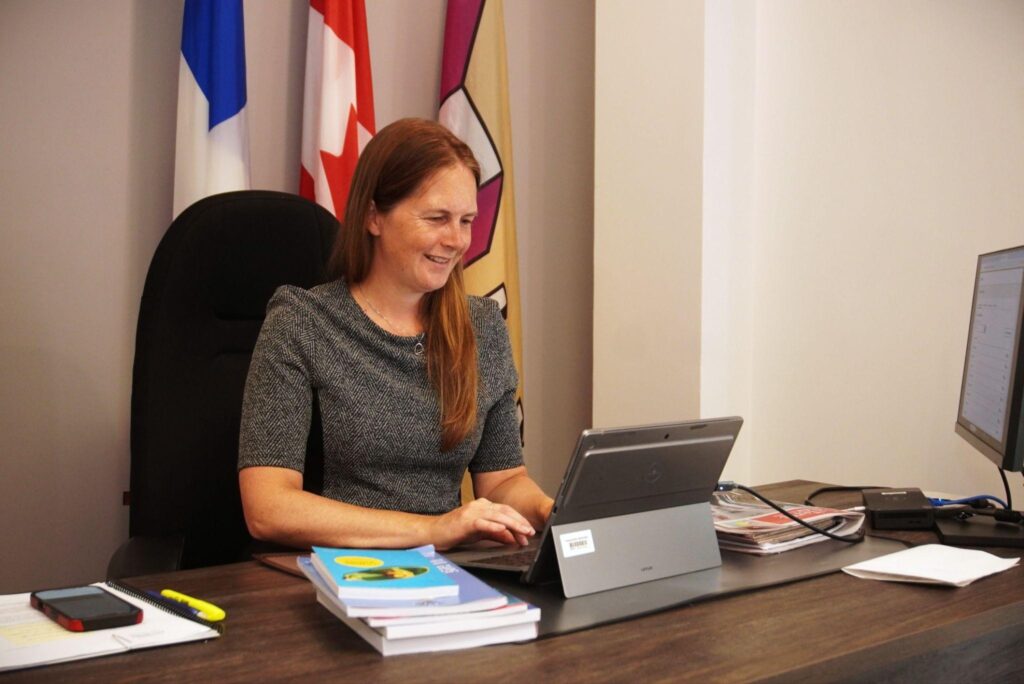By Matthew Daldalian, LJI Reporter

Quebec Liberal MNA Virginie Dufour sitting at her desk in her constituency office on August 18 2025. (Photo: Matthew Daldalian, Newsfirst Multimedia)
The collapse of international treaty negotiations in Geneva earlier this month has renewed calls for tougher measures against plastic pollution from Quebec Liberal MNA Virginie Dufour.
Dufour, who represents Mille-Îles and serves as the official opposition critic for the provincial environment minister, said the outcome highlights the urgency of stronger national and provincial action.
The MNA recently joined the Interparliamentary Coalition to End Plastic Pollution (ICEPP), a network of about 50 parliamentarians from more than 30 countries working to curb plastic waste worldwide.
In the lead-up to the talks, she sent a letter to federal environment minister Julie Dabrusin urging Canada to take a hard line at the negotiating table. The Geneva meetings ended without an agreement, after Canada and others rejected what Dufour described as a “really, really weak” draft treaty.
Dufour warned that relying solely on recycling will not solve the problem, noting that much plastic still ends up in the environment or is incinerated. She argued the focus must shift toward reducing production itself if the goal of ending plastic pollution is to be achieved.
“My goal was to make sure that Canada would have strong leadership in those treaty negotiations and not accept, you know, a treaty that does not address the real issues,” Dufour said.
From Plastics to Microplastics
For the MNA, the issue extends beyond waste management to a mounting public health concern.
“We don’t realize, but we all have microplastics inside, you know, our blood, in our head. And, you know, we know it’s a health issue,” she explained.
With Quebec’s health system consuming more than half of the provincial budget, she argued that a precautionary approach is necessary to limit future costs and protect public health.
Dufour said a global reduction target would translate locally into greater responsibility for producers, pointing to recent changes that make them accountable for handling municipal recycling.
“Everything we put in the blue bin now is handled by the producers of those products. And so hopefully they will start to use less plastic or at least use those that are recyclable,” she said.
Dufour pointed to a Terrebonne pilot project where restaurants switched to reusable utensils and dishes. Initially resistant, she said many changed their minds after subsidies helped them adopt the system and they quickly saw savings from reduced waste.
Plastic Production
Internationally, Dufour is calling for a cap on plastic production. She said output keeps rising every year, and without firm limits or targets, it will be impossible to bring production down.
She warned that well-intentioned local policies can backfire if not part of a broader strategy. As a former Laval city councillor, she recalled debates over banning thin plastic bags: “Everywhere where they banned those thin plastic bags, the production of plastic increased,” she said.
Next steps
Looking ahead, Dufour said she will continue pressing the issue both internationally and in Quebec.
“I’m gonna try to have more conscience about microplastics and the risks that are linked to them,” she said. “I would like the government to invest more in [microplastic] research. Municipalities are not equipped to filter them.”
Dufour said stronger efforts are needed to develop alternatives to plastic, warning that some replacements—like chemically treated cardboard straws—can be even more harmful than the plastics they replace.
Despite setbacks in Geneva, Dufour remains committed. “I am determined to continue my involvement with the ICEPP to contribute to the fight against plastic pollution, a real poison for human health and the environment,” she said in a statement on August 15.
In a previous version of this article, Virginie Dufour was described as the official opposition critic for the federal environment minister. She is the critic for the provincial environment minister. The article also referred to a Montreal pilot project on reusable utensils and dishes. The initiative is located in Terrebonne, not Montreal.
The Laval News regrets these errors.



